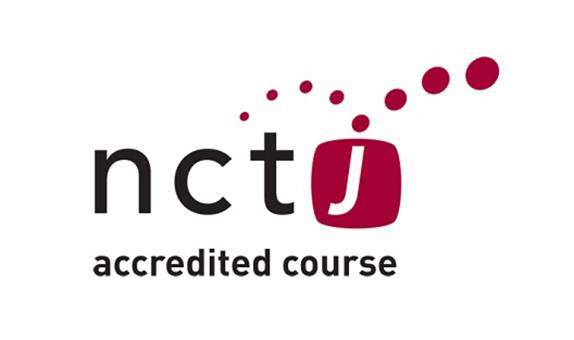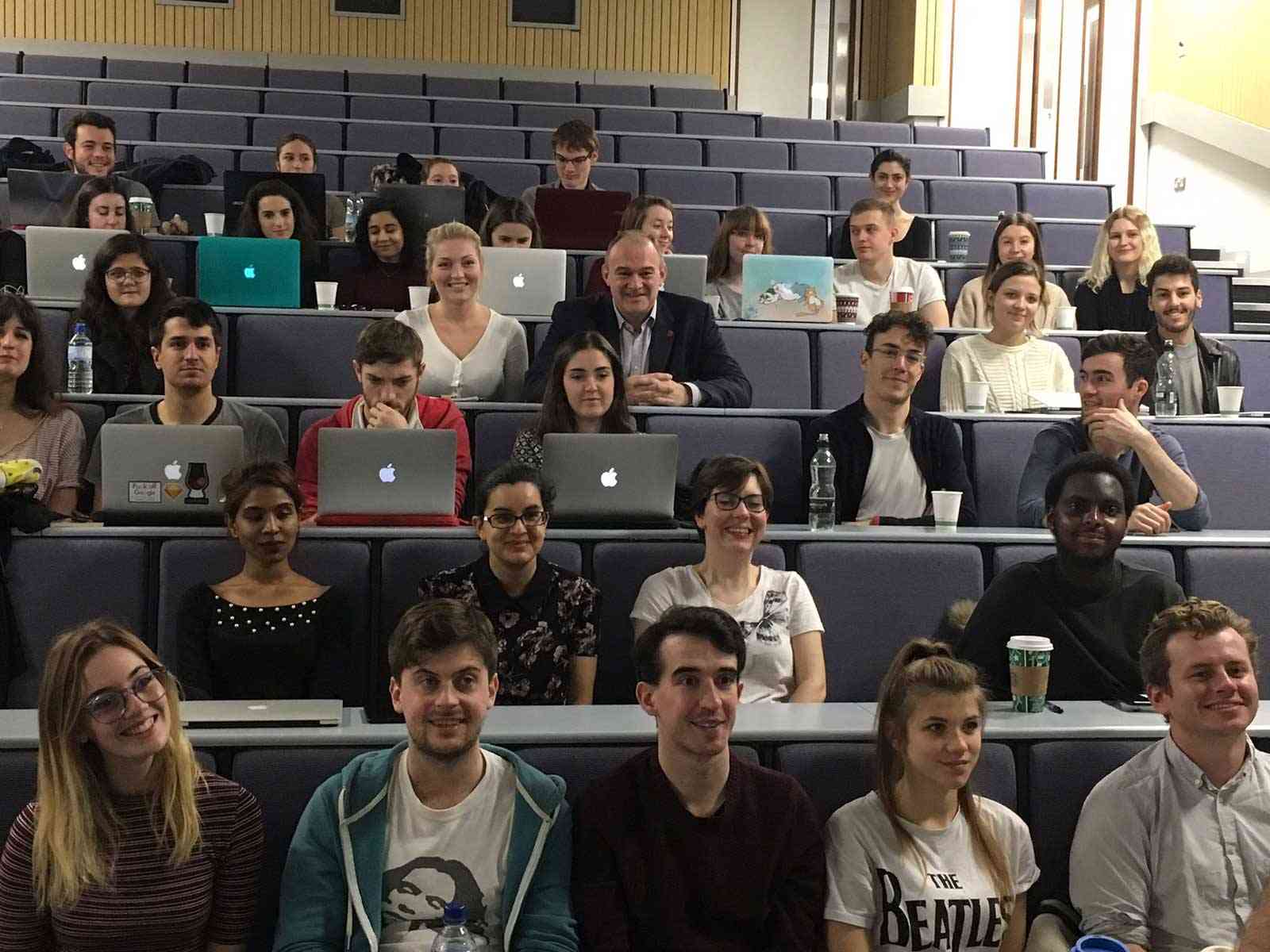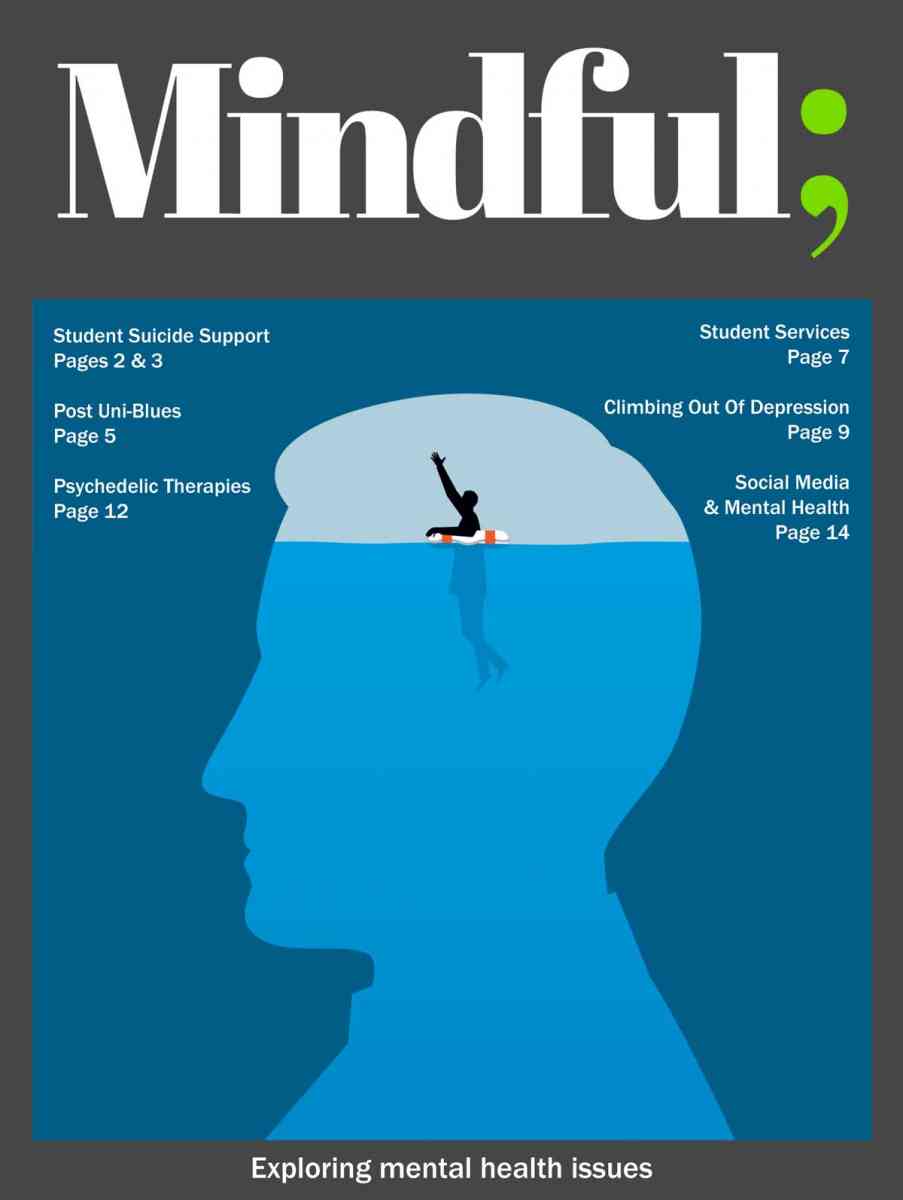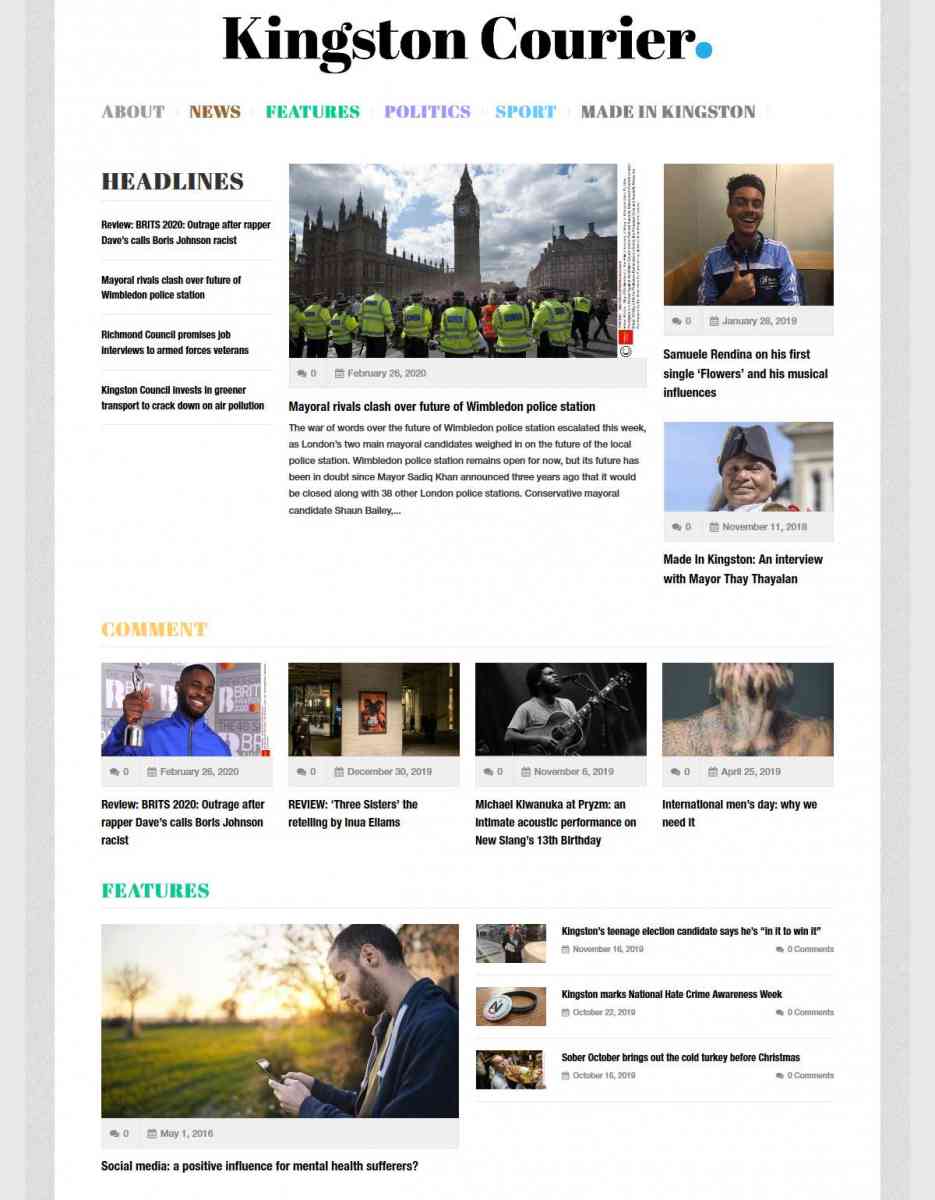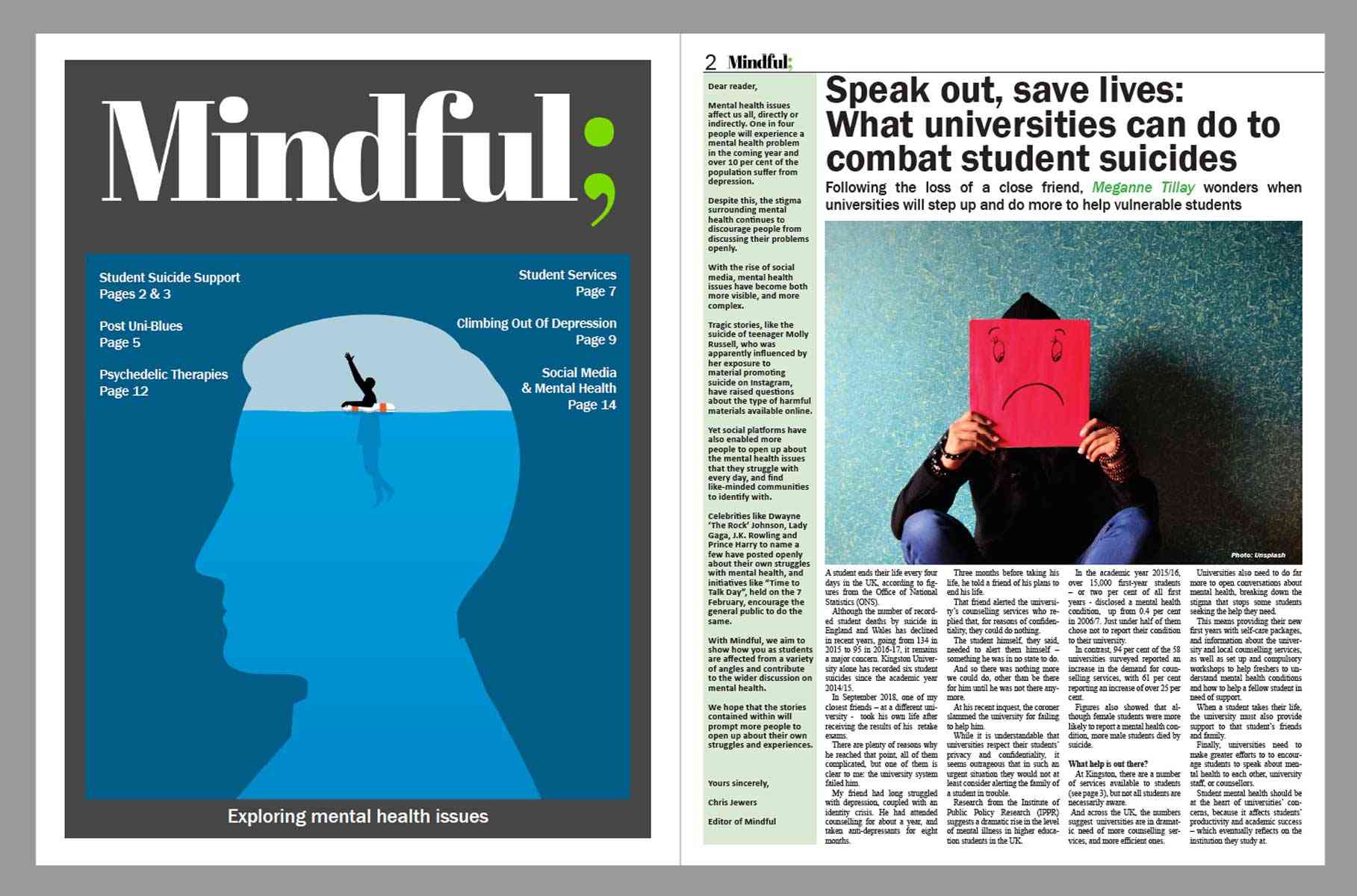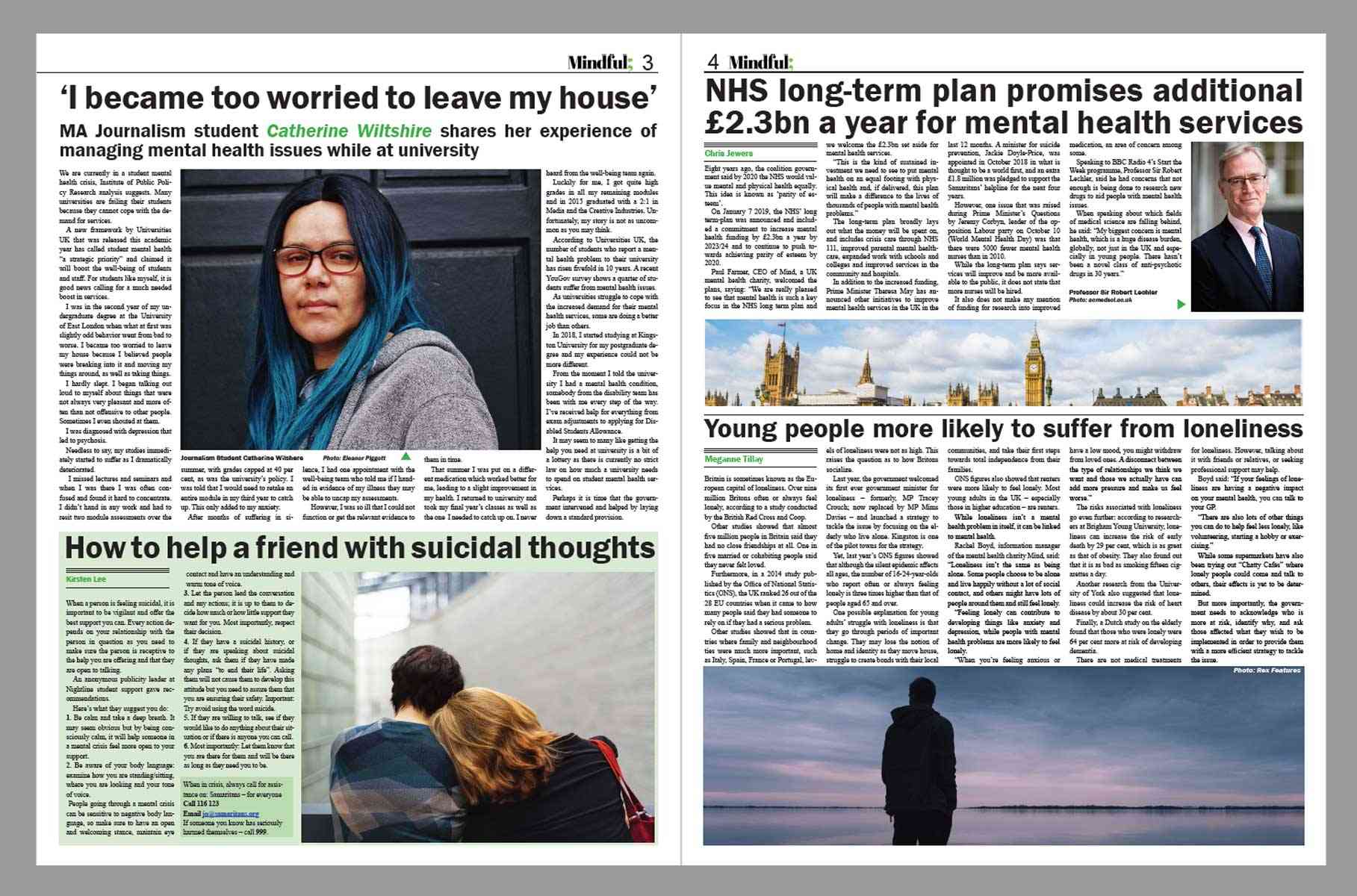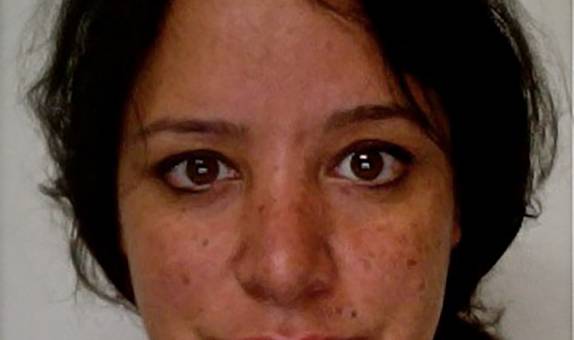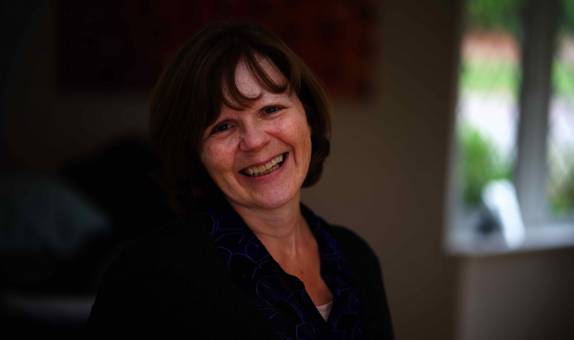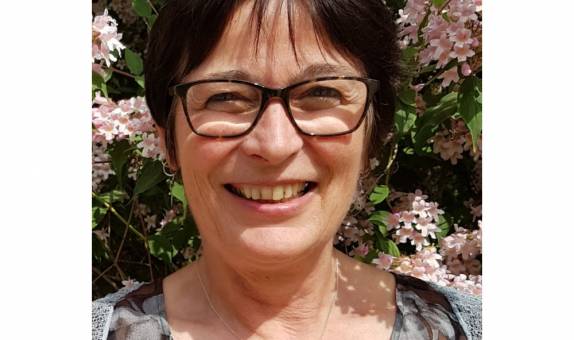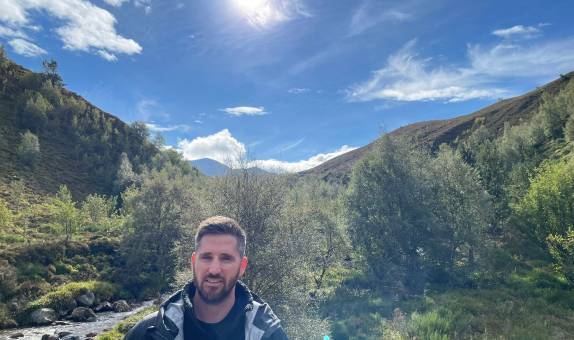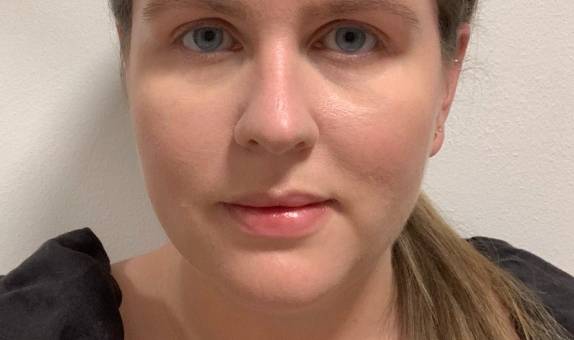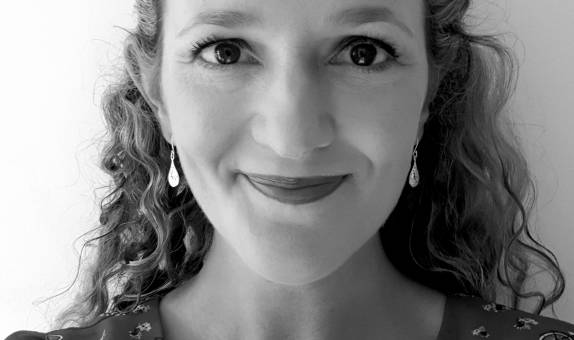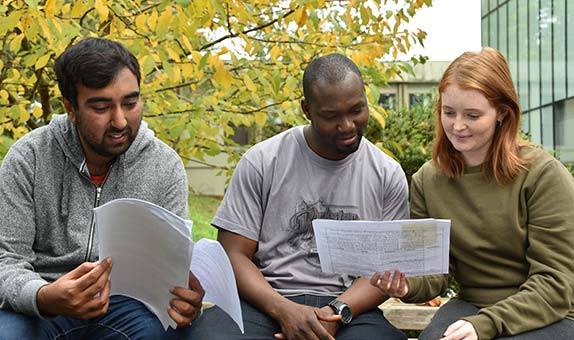Journalism PgDip/MA
Why choose this course?
All our graduates from 2023 are in journalism careers.
Accredited by the National Council for the Training of Journalists (NCTJ) for over a decade, our course will equip you for a career in journalism by offering the industry's most sought-after qualification alongside your postgraduate diploma or masters degree. The only London university to offer an NCTJ diploma alongside a news journalism MA, Kingston combines professional training and academic study with the skills you will need to succeed in this intensely competitive industry.
In the last reaccreditation report from the NCTJ, it was noted that "this course... plays a valuable role in producing industry-ready early career journalists". We offer Broadcast Journalism, and Shorthand as elective options alongside the NCTJ core modules.
This course offers professional skills such as news and feature writing, the latest digital and social media techniques, and media law.
You will be taught by practising journalists and have access to a newsroom with industry-standard software. Working for a live news website, the Kingston Courier, you will produce and edit multimedia content on everything from news to sports. You will also design and produce a newspaper supplement.
Alongside your core modules, you can choose from a range of specialisms. These could include Sports Journalism, Foreign Correspondence, Arts and Culture, Social Affairs, Fashion Journalism, Visual Journalism or Broadcast, where you will cover everything from making TV and radio packages to podcasts.
Please follow our Journalism Twitter to see some of the great work we and our graduates are doing.
| Mode | Duration | Start date |
|---|---|---|
| Full time | 1 year | September 2025 |
| Full time | 2 years including professional placement | September 2025 |
| Part time | 2 years | September 2025 |
| Main Location | Penrhyn Road |
Reasons to choose Kingston University
- 100% of our Class of 2023 are in journalism careers at employers that include the BBC, Daily Mail and LBC.
- Kingston is the only university in London to offer the NCTJ diploma alongside an MA news journalism degree. The diploma, highly regarded by employers, is a passport to a wide range of jobs.
- This is a very hands-on course which will prepare you to work as a journalist.
- You will be taught by practising journalists on industry-standard software.
The Art School Experience
As part of Kingston School of Art, students on this course benefit from joining a creative community where collaborative working and critical practice are encouraged.
Our workshops and studios are open to all disciplines, enabling students and staff to work together, share ideas and explore multi-disciplinary making.

Accreditation
National Council for the Training of Journalists (NCTJ)
Kingston's links with the National Council for the Training of Journalists (NCTJ) open many doors for our students, including opportunities to attend networking events. Eligible students on our course have the option of applying for the NCTJ-run Journalism Diversity Fund, which provides bursaries for living and study costs to a wide range of students.
'Tutors clearly go the extra mile with pastoral care, and supporting students with particular needs.'
NCTJ accreditation report
What you will study
You will develop a range of professional, practical skills and knowledge that will equip you for a job in journalism, including news and feature writing, public affairs, online journalism, media law and shorthand. You will have the opportunity to report and write for our news website, the Kingston Courier, which is run by our postgraduate students. Using your acquired design skills, you'll learn to produce a print supplement to our University newspaper, The River.
Once you have achieved the PgDip, which runs over two semesters from September to May, you can continue on to the MA degree by researching and writing a dissertation or carrying out an equivalent work-based practical project. This will develop your critical thinking and analytical skills, and give you the chance to carry out independent academic research.
The core module is worth 60 credits. You'll be expected to complete 180 credits altogether.
Modules: Full-time study
Modules: Part-time study
Optional placement year
You can choose to study for either a PgDip or MA award. If you opt for the MA, you will have the opportunity to do a work-based final project, or a dissertation which allows you to focus on an area of interest and gain valuable research skills, as a potential gateway to a PhD.
Core modules
Practical Journalism Now: Multimedia Skills and Employability
60 credits
This module – which includes a two-week work placement outside the University – gives you the practical skills needed to work as a journalist. You'll get a chance to practise your core skills of researching, writing, interviewing and editing, as you join the team running multimedia news website the Kingston Courier. You'll learn a wide range of skills, including video, podcasting, mobile journalism, data journalism and newspaper design. You'll also learn how to harness the power of social media and editorial analytics. During the course of the module, you will build a wide-ranging portfolio to showcase all of the skills learned on the MA, and learn how to best prepare yourself to find work as a journalist.
As well as counting towards your MA, this module leads to the NCTJ Essential Journalism exam and e-portfolio.
Journalism in Context: Law, Ethics and the Industry
30 credits
This year-long module aims to provide students with a thorough understanding of the legal and regulatory structure within which journalists operate. In recent decades, the industry has changed significantly as it adapts to the opportunities and challenges of the internet age. You will be invited to examine and debate the direction and future of journalism, thinking about everything from legal restrictions on reporting to fake news to the public's perception of journalists.
As well as counting towards your MA, this module leads to the NCTJ's Essential Law and Ethics exams.
Non credit-bearing modules taken as part of the NCTJ diploma
Shorthand (Postgraduate)
0 credits
Students on the MA Journalism course may study Teeline shorthand. Shorthand is an extremely useful skill for journalists, and one prized by employers: it generates trust with interviewees and increases the speed and efficiency of reporting. You will be taught Teeline, which uses written outlines derived from consonants, by a teacher of longstanding experience; the aim is to reach a speed of 100 words per minute (wpm) by the end of the course.
Shorthand exams at 60, 80 and 100 wpm, count towards the NCTJ diploma.
Journalism for a Digital Audience
0 credits
Working with digital platforms is a core part of a journalist's work. On this module will you will learn the knowledge and skills to operate as an audience-focused digital journalist in a multimedia newsroom including understanding and using website CMS systems to enhance the user experience, how to build and execute strategies based on audience data, interacting with the audience, making the most of illustrations/video and how to develop brands. The module, which is not-for-credit, is taken by all students studying for the MA Journalism. It culminates in the submission of coursework and the exam for the NCTJ Journalism for a Digital Audience module.
MA students also choose either the Journalism Dissertation or the Practical Project
Practical Journalism Project
60 credits
Students who wish to go straight into the workplace can opt to do a Practical Journalism Project module while they work, in lieu of a dissertation. This module includes a piece of academic research as well as a portfolio of journalism produced as a working journalist. You will also be asked to reflect on your practice, considering how you can learn from your experience and develop as a journalist. This module takes place between May and September, after core teaching has finished.
MA Journalism Dissertation
60 credits
Students wishing to undertake a substantial piece of academic work can opt to take the dissertation module, which is carried out between May and September, after core teaching has finished. Once you have narrowed down your area of interest, you will be given a supervisor who will work individually with you to help you develop your ideas, frame a hypothesis and conduct appropriate primary and secondary research. The MA dissertation is a good bridge for any students wishing to pursue further study, at PhD level or beyond.
Optional modules
Broadcast Journalism
30 credits
This module aims to teach students the principles and practice of broadcast journalism. You will learn to use a variety of industry-standard software and hardware, and acquire the technical skills necessary to produce quality radio and television packages and podcasts. You'll learn about broadcast regulation, find out how to pitch stories to potential employers, and develop your presentation skills, receiving voice coaching and taking part in radio and television news days. Alongside traditional methods of broadcast, you will consider what opportunities the internet offers for both storytelling and live reporting.
As well as counting towards your MA, this module leads to the NCTJ's Broadcast Journalism exams.
Journalism Specialism
30 credits
This highly practical module allows students to explore in depth, and actively engage with, a range of journalism specialisms which could include: sports journalism, fashion journalism, foreign correspondence, arts and culture journalism, social affairs or visual journalism.
Students will develop the researching, writing, reporting and digital skills they acquired through prior learning to produce professional copy and other outputs pertinent to each specialism, such as social media, video and visualisations. They will apply their newly-gained specialist knowledge and acquired skills to the production of a portfolio of cutting-edge specialist journalism.
The practices of each area of specialist journalism will be placed in a context throughout the module. Through a series of lectures and in-class discussions students will gain insight into each specialism and how it works. They will acquire an appreciation of the historical, cultural, global and economic issues which specialist journalists must understand. The module prepares students to pursue jobs within specialist beats upon graduation.
We offer a part-time study option to help you fit the course around other commitments.
Year 1 core module
Practical Journalism Now: Multimedia Skills and Employability
60 credits
This module – which includes a two-week work placement outside the University – gives you the practical skills needed to work as a journalist. You'll get a chance to practise your core skills of researching, writing, interviewing and editing, as you join the team running multimedia news website the Kingston Courier. You'll learn a wide range of skills, including video, podcasting, mobile journalism, data journalism and newspaper design. You'll also learn how to harness the power of social media and editorial analytics. During the course of the module, you will build a wide-ranging portfolio to showcase all of the skills learned on the MA, and learn how to best prepare yourself to find work as a journalist.
As well as counting towards your MA, this module leads to the NCTJ Essential Journalism exam and e-portfolio.
Year 2 core module
Journalism in Context: Law, Ethics and the Industry
30 credits
This year-long module aims to provide students with a thorough understanding of the legal and regulatory structure within which journalists operate. In recent decades, the industry has changed significantly as it adapts to the opportunities and challenges of the internet age. You will be invited to examine and debate the direction and future of journalism, thinking about everything from legal restrictions on reporting to fake news to the public's perception of journalists.
As well as counting towards your MA, this module leads to the NCTJ's Essential Law and Ethics exams.
MA students also choose either the Journalism Dissertation or the Practical Project
Practical Journalism Project
60 credits
Students who wish to go straight into the workplace can opt to do a Practical Journalism Project module while they work, in lieu of a dissertation. This module includes a piece of academic research as well as a portfolio of journalism produced as a working journalist. You will also be asked to reflect on your practice, considering how you can learn from your experience and develop as a journalist. This module takes place between May and September, after core teaching has finished.
MA Journalism Dissertation
60 credits
Students wishing to undertake a substantial piece of academic work can opt to take the dissertation module, which is carried out between May and September, after core teaching has finished. Once you have narrowed down your area of interest, you will be given a supervisor who will work individually with you to help you develop your ideas, frame a hypothesis and conduct appropriate primary and secondary research. The MA dissertation is a good bridge for any students wishing to pursue further study, at PhD level or beyond.
Optional modules
Broadcast Journalism
30 credits
This module aims to teach students the principles and practice of broadcast journalism. You will learn to use a variety of industry-standard software and hardware, and acquire the technical skills necessary to produce quality radio and television packages and podcasts. You'll learn about broadcast regulation, find out how to pitch stories to potential employers, and develop your presentation skills, receiving voice coaching and taking part in radio and television news days. Alongside traditional methods of broadcast, you will consider what opportunities the internet offers for both storytelling and live reporting.
As well as counting towards your MA, this module leads to the NCTJ's Broadcast Journalism exams.
Journalism Specialism
30 credits
This highly practical module allows students to explore in depth, and actively engage with, a range of journalism specialisms which could include: sports journalism, fashion journalism, foreign correspondence, arts and culture journalism, social affairs or visual journalism.
Students will develop the researching, writing, reporting and digital skills they acquired through prior learning to produce professional copy and other outputs pertinent to each specialism, such as social media, video and visualisations. They will apply their newly-gained specialist knowledge and acquired skills to the production of a portfolio of cutting-edge specialist journalism.
The practices of each area of specialist journalism will be placed in a context throughout the module. Through a series of lectures and in-class discussions students will gain insight into each specialism and how it works. They will acquire an appreciation of the historical, cultural, global and economic issues which specialist journalists must understand. The module prepares students to pursue jobs within specialist beats upon graduation.
Part-time students can opt to do shorthand in either their first or second year
Shorthand (Postgraduate)
0 credits
Students on the MA Journalism course may study Teeline shorthand. Shorthand is an extremely useful skill for journalists, and one prized by employers: it generates trust with interviewees and increases the speed and efficiency of reporting. You will be taught Teeline, which uses written outlines derived from consonants, by a teacher of longstanding experience; the aim is to reach a speed of 100 words per minute (wpm) by the end of the course.
Shorthand exams at 60, 80 and 100 wpm, count towards the NCTJ diploma.
Many postgraduate courses at Kingston University allow students to do a 12-month work placement as part of their course. The responsibility for finding the work placement is with the student; we cannot guarantee the work placement, just the opportunity to undertake it. As the work placement is an assessed part of the course, it is covered by a student's Student Route visa.
Find out more about the postgraduate work placement scheme.
Module
Professional Placement
120 credits
The Professional Placement module is a core module for those students following a masters programme that incorporates professional placement learning, following completion of 120 credits. It provides you with the opportunity to apply your knowledge and skills to an appropriate working environment, and to develop and enhance key employability skills and subject-specific professional skills in your chosen subject. You may wish to use the placement experience as a platform for your subsequent major project module, and would be expected to use it to help inform your decisions about future careers.
Please note
Optional modules only run if there is enough demand. If we have an insufficient number of students interested in an optional module, that module will not be offered for this course.
Student work gallery
Entry requirements
Teaching and assessment
Teaching methods include workshops, lectures, student-led seminars and guided research.
Assessment methods are often based on the production of news stories, features and essays. You will also be appraised on your performance on the postgraduate publications which you work on during the course. The NCTJ diploma is assessed by exams and coursework.
You will also benefit from weekly guest lectures – in past years guests have included senior journalists and editors at The Guardian, Glamour, Daily Express, FT, Vogue, Pink News and Full Fact.
Who teaches this course?
This course is delivered by one of the top-ranked journalism departments in the country. You'll graduate with excellent employment prospects: students from recent years have entered positions at Grazia, The Financial Times, The Daily Telegraph, The Sun, Channel Four News, The Daily Mail, Closer, OK!, The Daily Express, Dow Jones, Metro, Associated Press, South West News, The Lawyer, Pink News, Gulf News and a range of local newspapers.
You'll be taught by a team of dedicated lecturers who are practising journalists with a wide range of experience and insider knowledge about working in today's industry. Postgraduate students may also contribute to the teaching of seminars under the supervision of the module leader.
Alongside the academic staff, you'll benefit from high-profile guest speakers, who have previously included Anoosh Chakelian, deputy web editor at the New Statesman; Will Dean, commissioning editor G2 (Guardian); Radhika Sanghani, feature writer, Daily Telegraph; Rachel Rodriguez, social media producer, CNN International.
Fees for this course
Additional costs
Depending on the programme of study, there may be extra costs that are not covered by tuition fees which students will need to consider when planning their studies. Tuition fees cover the cost of your teaching, assessment and operating University facilities such as the library, access to shared IT equipment and other support services. Accommodation and living costs are not included in our fees.
Where a course has additional expenses, we make every effort to highlight them. These may include optional field trips, materials (e.g. art, design, engineering), security checks such as DBS, uniforms, specialist clothing or professional memberships.
Facilities
The journalism department has a dedicated newsroom, fully equipped with dual-booting iMacs, professional newswires from Rex Images and the Press Association, 24-hour news channels and industry standard software such as Adobe InDesign, Adobe Photoshop and Adobe Premiere Pro.
The campus at Penrhyn Road is a hive of activity, housing our fantastic new Town House, with four floors of study space and our extensive library, the main student restaurant, and a host of teaching rooms and lecture theatres.
The Town House offers group study spaces for when you need to work together. The light, airy top floor cafe serves light snacks and drinks, and has fabulous views!
At the heart of the campus is the John Galsworthy building, a six-storey complex that brings together lecture theatres, flexible teaching space and information technology suites around a landscaped courtyard.
See a virtual tour of Penrhyn Road campus
Resources in London
From Kingston, a 30-minute train journey takes you to central London. Here you will find the biggest concentration of press and publishing in the UK. This gives you the opportunity to undertake work experience in high-profile media environments.
After you graduate
In addition to a possible career as a journalist, alternatives may include work in publishing, advertising and marketing, film, television, radio, arts management, new media, business and teaching.
Every year the vast majority of our students go on to successful careers, mostly in journalism and the media, or related industries. In the last few years, our graduates progressed to roles at CNN, the Daily Express, Wandsworth Guardian, Accountancy Age, Barcroft media, Container Management, Metro, Grazia, Richmond and Twickenham Times and Investors Chronicle.
What our students and graduates say
Alumni spotlight
The masters course at Kingston University really prepared me for a career in journalism and allowed for a seamless transition into working for a national paper.
Jessica Hamilton, audience reporter, MailOnline
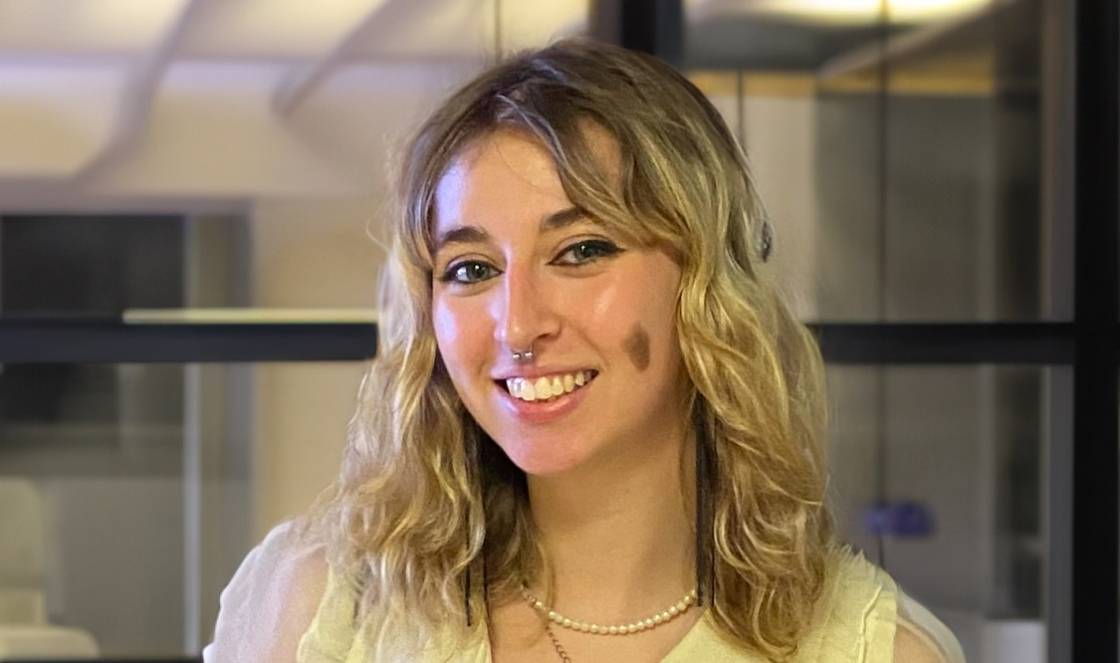
Links with business and industry
Guest lectures
The Journalism Department hosts weekly guest lectures and other events led by industry experts with a strong focus on developments in the fast-changing world of digital media and journalism. Recent speakers have included:
- Samira Ahmed – An award-winning journalist with 20 years' experience in print and broadcast
- Anoosh Chakelian – Deputy web editor at the New Statesman
- Will Dean – commissioning editor G2 (Guardian)
- David Jenkins – Editor of Little White Lies, a bi-monthly movie magazine powered by illustration that has just reached its 60th issue
- Ben Machell – Writer for The Times, columnist for ES Magazine
- Fatiman Manji – News correspondent and presenter at Channel 4 News
- Rachel Rodriguez – social media producer, CNN International
- Radhika Sanghani – feature writer, Daily Telegraph
- Samira Shackle – Deputy Editor of New Humanist, and freelance journalist specialising in politics, terrorism and gender
- Alex Stedman – Fashion blogger The Frugality, former style editor at Red magazine
- Farrah Storr – Editor-in-Chief of Cosmopolitan, former editor of Women's Health
- Rossalyn Warren – An award-winning foreign affairs journalist, formerly of BuzzFeed News. Her reporting has been published in The New York Times, Washington Post, Guardian, VICE, CNN, BBC, ELLE, Newsweek, and Teen Vogue.
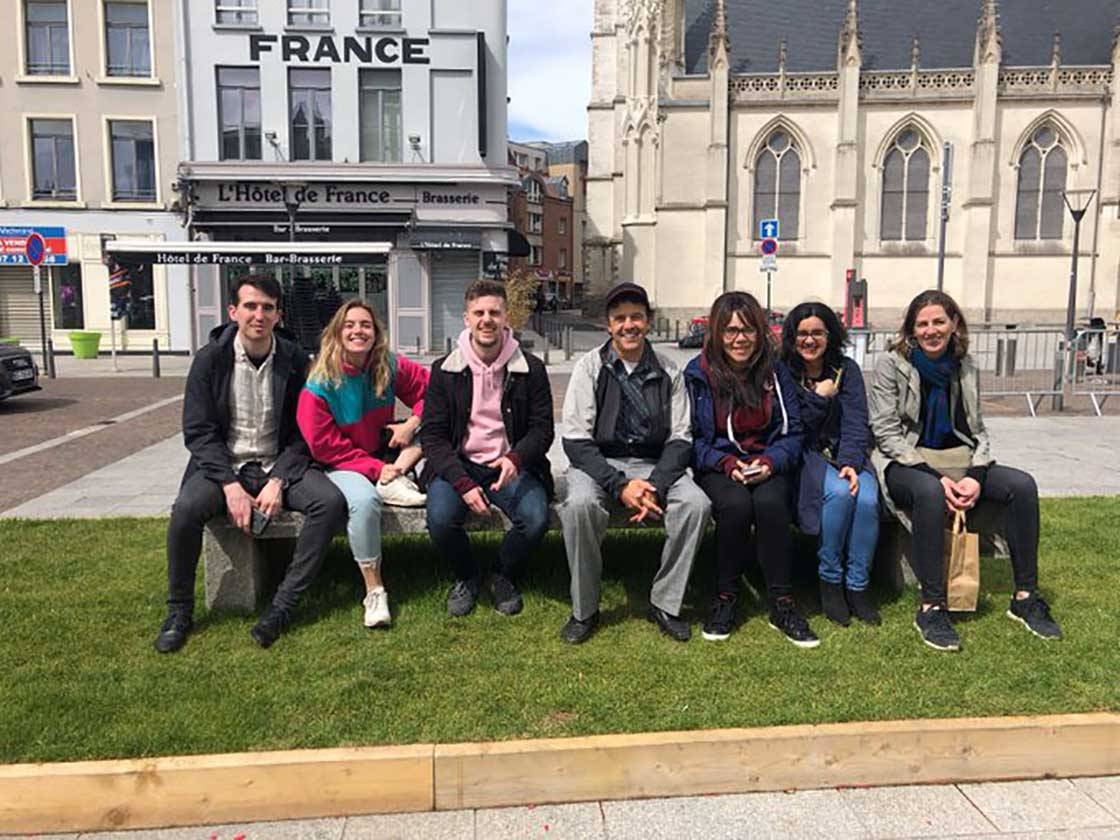
Links with business and industry
Events
We hold events on current affairs such as the recent panel discussion ‘Truth and Terror' examining the relationship between the Islamic State and the media and a live debate on the future of press regulation between Hacked Off and the Press Complaints Commission.
The department also hosts the annual Journalism Oscars to celebrate the brightest and best journalism students, with categories including news reporter, feature writer, digital journalist and postgraduate of the year.
Course changes and regulations
The information on this page reflects the currently intended course structure and module details. To improve your student experience and the quality of your degree, we may review and change the material information of this course. Course changes explained.
Programme Specifications for the course are published ahead of each academic year.
Regulations governing this course can be found on our website.



